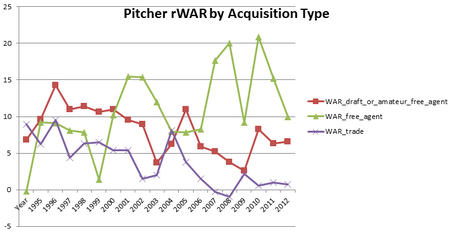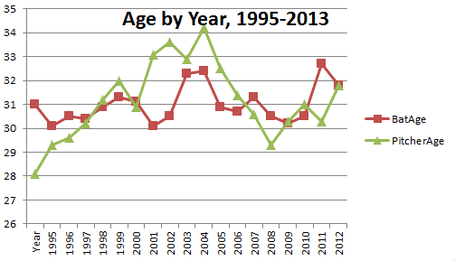
The late-90's teams were a joy, but that doesn't make their roster construction any better than later years in the dynasty era.
Build a core. Get younger in the field. Abandon the over-the-hill free agents. These are the kind of criticisms levied against the Yankees these days. Starting next year, we're going to be heading into the post-Core Four Era, and people are concerned. After nearly 20 years of constant winning, the future isn't as certain as it once was. Competitive balance has made it more difficult to just scoop up talent, and free agency isn't the boon it once was. Things are changing. So, of course, people reminisce. As people reminisce about the "good 'ole days", we enter what is of course a classic case of Golden Age Fallacy. The issues of the dynasty years (1996-2000) are pushed aside, while everything after that was a failure. That is of course not true at all, and the myth that the roster construction during that period was superior is outrageous.
What people forget about the dynasty years is that they weren't as reliant on the "farm" as people would believe it to be. And in contrast, the later years weren't as reliant on free agents as people would believe. Each had varying levels of success, and one could not draw a conclusion that one method was better than another. What made the dynasty teams great weren't that they were carried to the World Series via the farm (like other small market teams), but that they were equal parts free agency, trade, and amateur players. Take a look at position player rWAR by acquisition type from 1995 to 2013:
If it doesn't look like there is a pattern, that's because there is none. What's even more telling is that the level of contribution via the draft or amateur free agent has generally remained the same over the course of the Yankees' most successful years. And here are the pitchers:
This area is where the criticism may hold true, but only to an extent. The level of contribution via the farm has been extremely low in recent years, and you can obviously see how free agents then supplemented that. But one could also say that the team is turning towards younger arms. Michael Pineda, Masahiro Tanaka, David Phelps, Adam Warren, and Dellin Betances are all young. The organization has also found almost no production in their trade endeavors, another avenue they could pursue as other wells run dry.
Frankly, the composition of each year's roster construction was so unique that to draw a conclusion that the late-90's teams were the "right" way to build a ball club and that the latter teams were the incorrect way to build a ball club is just fallacious. Let's take a look at the Core Four in 1998, for example, and compare them to a completely different core later in this era.
| Core Four, 1998 | rWAR | Core Faux, 2010 | rWAR | |
| Derek Jeter | 7.5 | Brett Gardner | 7.3 | |
| Jorge Posada | 2.9 | Robinson Cano | 8.1 | |
| Andy Pettitte | 2.4 | David Robertson | 0.7 | |
| Mariano Rivera | 2.8 | Phil Hughes | 2.0 |
As you can see, the core of 2010 actually produced more than arguably the greatest Yankee team of all-time, yet I'm sure fans of 2010 would argue that the team was way, way too old. Are they getting old? Here's a graph of batter and pitcher ages across those aforementioned years:
Of course the team had very young players at the beginning of their run, but you can see that the ages went in ebbs and flows. They were very old in 2003-2004, but those were some of their best teams. They had great success at such an age and they were able to sustain it. The idea that older age does not give way to sustainable success was obviously not true.
The Yankees had, currently have, and will continue to have a core of younger players to supplement free agents and trade acquisitions. That may change with changes in free agent strategy, but the team will always spend money. And they should. The Core Four was great, but the teams of the 90's and 00's would be naught without players like Mike Mussina, Roger Clemens, David Cone, Alex Rodriguez, and the like--some of the greatest players of their generations. An important part of the Yankees is big signings--that will always be the case--and I doubt that the team will ever go the way of the Astros and gut the organization. Even for them that is proving to be difficult and does not necessarily yield the core they're looking for. People may feel uneasy that the team will enter a phase where all they do is sign free agents to plug holes, but if the trade deadline, and this season in general, has taught us anything, it's that the organization will do whatever works.


